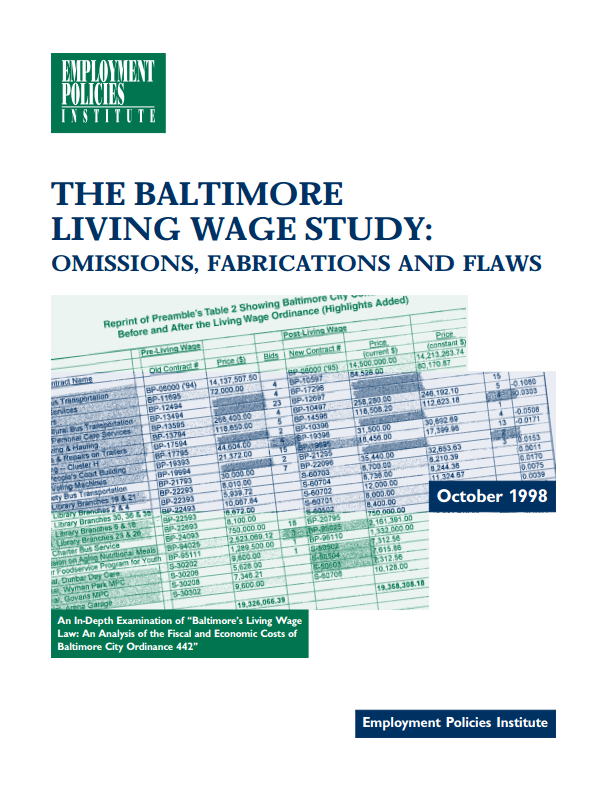In December 1994, Baltimore Mayor Kurt Schmoke signed into law one of the nation’s first “living wage” ordinances. It required businesses with city contracts to pay their workers a minimum of $7.70 per hour by 1999, approximately 50% above the current federal minimum wage. Since then, “living wage” campaigns have sprung up around the country.
In October 1996, the Preamble Center for Public Policy (“Preamble”) published a study of Baltimore’s mandated wage (Baltimore’s Living Wage Law: An Analysis of the Fiscal and Economic Costs of Baltimore City Ordinance 442) in which they compared the costs of 23 matched pairs of city contracts before and after implementation of the living wage legislation. In spite of the fact that labor input prices increased, Preamble claimed to find that contract costs declined rather than increased following implementation of the “living wage” mandate. “The predicted negative effects of raising wages for workers employed on city contracts (higher costs, fewer jobs, and fewer bids on city contracts) have not materialized in Baltimore.”1 In spite of the fact that this study had not been peer-reviewed or vetted by anyone outside of Preamble, its findings were widely heralded by the media. Organized labor and some politicians offered the study as evidence that mandates for higher wages are cost-effective tools for fighting poverty. More than a dozen cities have since relied on Preamble’s version of Baltimore’s experience in setting wage rates.
Had the media looked at Preamble’s study with an even slightly critical eye, they would have discovered major flaws. Had they looked more closely, they would have found outright deceptions. The Employment Policies Institute (“EPI”) conducted a thorough examination of the Preamble Center’s “living wage” study, including independent verification of each of the contract prices listed in the study. This examination reveals extremely sloppy research and an intention to lend false credence to these mandated wage hike campaigns.
The primary conclusion of the Preamble Center’s study — that the City of Baltimore’s contract costs declined following implementation of the living wage legislation — hinges entirely upon the costs associated with one of the 23 before-and-after contract pairs analyzed by Preamble — the “Nutritional Meals Program Management” contract pairs. Without this one contract, Preamble’s conclusion is turned on its head: contract costs did, indeed, rise rather than fall after implementation of Baltimore’s living wage legislation. EPI’s examination of the City of Baltimore’s official contract award records reveals that Preamble fabricated information about this contract, presumably to justify its inclusion in the study.
